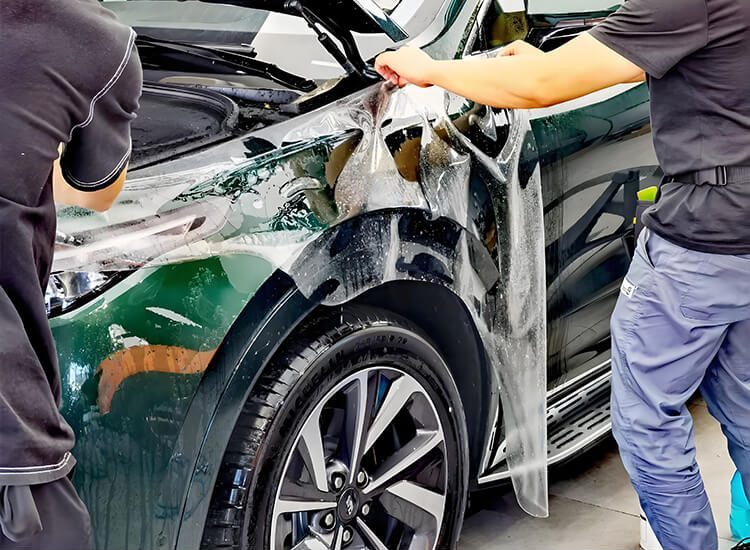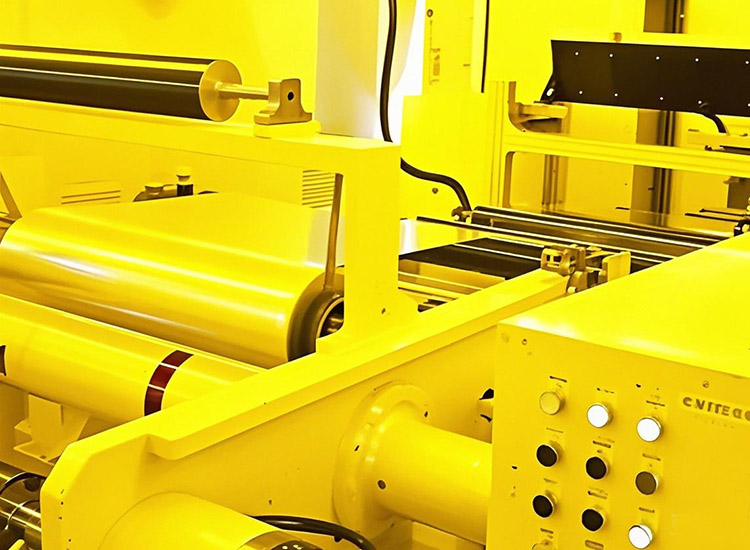Paint Protection Film vs Ceramic Coating: Which Offers Better Value?
When it comes to protecting your car’s paint, two popular options stand out: Paint Protection Film (PPF) and Ceramic Coating. Both claim to preserve your vehicle’s finish, but which one offers better long-term value? That depends on your driving habits, expectations, and budget. In this post, we’ll break down the differences, real-world pros and cons, costs, maintenance, and how to choose between them. Whether you’re driving a brand-new Tesla or a daily commuter, knowing what really protects your car paint can help you avoid costly mistakes and enjoy a cleaner, glossier ride for years.
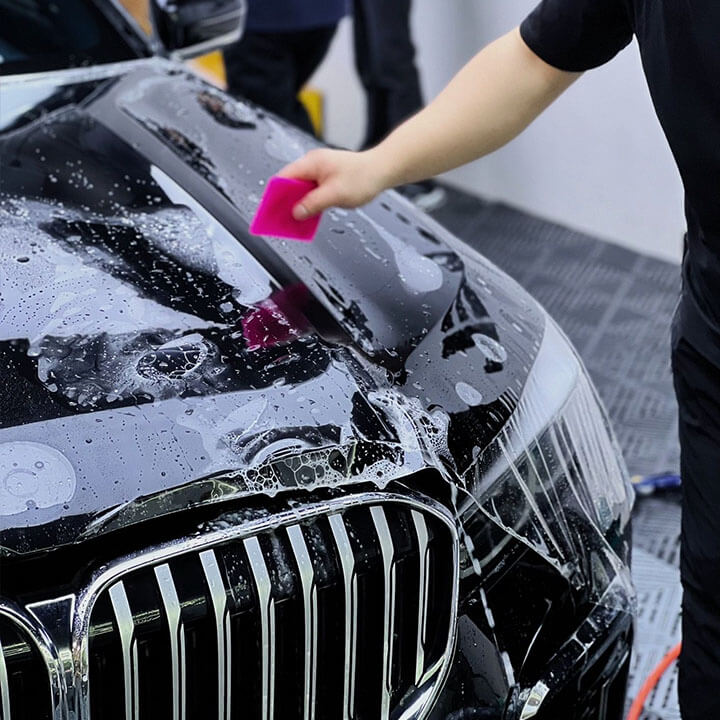
What Is Paint Protection Film (PPF)?
How It Works
Paint Protection Film—often called PPF, clear bra, or TPU film—is a transparent, durable urethane film applied to your car’s painted surfaces. It’s designed to absorb impacts and resist scratches, chips, and stains. Most high-end automotive paint protection films today are self-healing, meaning small scratches vanish when heat is applied, like from the sun or a heat gun. If you’re curious about what kind of material PPF is made from, check out Paint Protection Film Materials for a technical breakdown of TPU, TPH, and PVC options.
Where It’s Used
PPF is commonly applied to high-impact areas like the front bumper, hood, fenders, side mirrors, and door edges. Some car owners opt for full-body coverage for maximum protection. It’s especially beneficial for cars that face a lot of road debris, like highway driving or mountainous areas with loose gravel.
What It Protects Against
- Rock chips
- Swirl marks and light scratches
- Bug splatter
- Bird droppings
- Salt and sand
- UV damage
If you’ve been asking, “is paint protection film worth it?”, the answer often leans yes—especially for new cars, black cars, and luxury vehicles.
What Is Ceramic Coating?
How It Works
Ceramic Coating, or nano coating, is a liquid polymer that bonds with your car’s factory paint, creating a hydrophobic (water-repelling) layer. Once cured, it forms a slick, glossy barrier that repels water, dirt, and light contaminants. Think of it like a high-tech wax, but much longer lasting.
Common Types
You’ll see terms like nano-ceramic coating, graphene coating, or ceramic paint coating on the market. All these are variations, but they work similarly by enhancing shine, improving water beading, and providing a semi-permanent layer of protection.
What It Protects Against
- UV rays (fading)
- Oxidation
- Minor chemical stains
- Light etching
- Easier cleaning (reduced dirt buildup)
Ceramic coating is often praised for its ease of maintenance and sleek appearance, but does ceramic coating protect better than PPF? The answer is more nuanced.
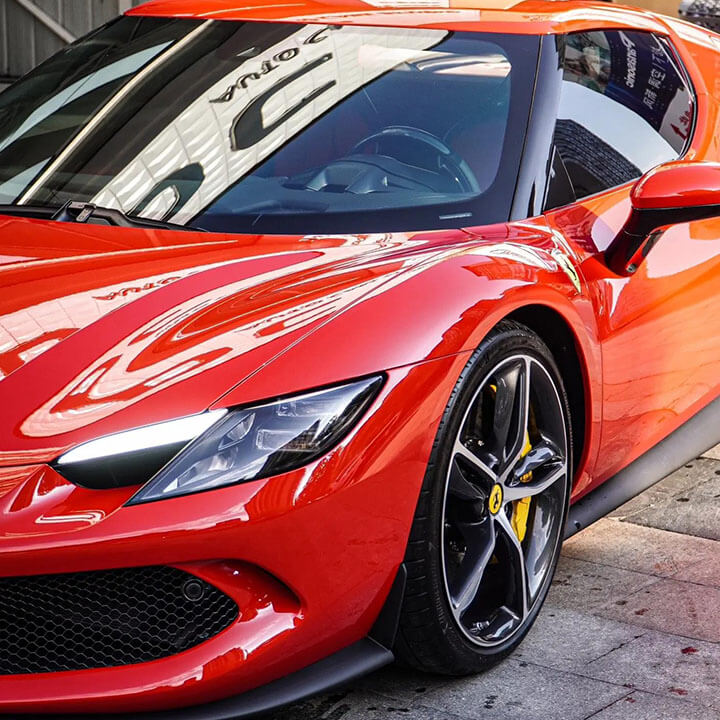
PPF vs Ceramic Coating: Side-by-Side Comparison
Protection Level
PPF offers physical protection. It can take a hit from small rocks and not show a mark. It’s the only solution that can prevent chips and scratches effectively. Ceramic Coating, by contrast, is more about chemical and UV resistance—it won’t stop a rock chip. Want to explore different PPF options? Learn more from Types of Paint Protection Film to understand which one fits your needs.
Gloss and Shine
Ceramic Coating tends to offer a deeper gloss and hydrophobic effect. PPF can also look glossy, especially high-end versions, but it’s primarily about defense, not aesthetics. However, some car owners apply ceramic coating under PPF or even on top for the best of both worlds.
Durability
When maintained well, both can last several years. PPF generally lasts 5–10 years, depending on the brand and exposure. Ceramic Coating can last 2–5 years depending on the product and how it’s maintained.
Maintenance Needs
Both reduce the frequency of washing, but in different ways. Ceramic coatings make the car easier to clean, as dirt and water don’t stick easily. PPF adds that benefit but also protects against physical wear. In terms of effort, both require gentle hand washes and avoidance of harsh chemicals.
Cost Comparison: How Much Does PPF Cost vs Ceramic Coating?
Initial Cost
PPF is more expensive—expect to pay $1,500 to $6,000 depending on coverage. A full-body wrap can be near the cost of a respray. Ceramic Coating, on the other hand, is cheaper upfront, ranging from $500 to $2,000 depending on the quality and preparation. For a deeper look into pricing variables, see this detailed Paint Protection Film Cost Breakdown.
Long-Term Value
Which is better: ceramic coating or PPF for new cars? It depends. If you live in a region with harsh winters or lots of gravel roads, PPF is a smart investment. For those who care more about gloss and ease of cleaning and are budget-conscious, Ceramic Coating makes sense.
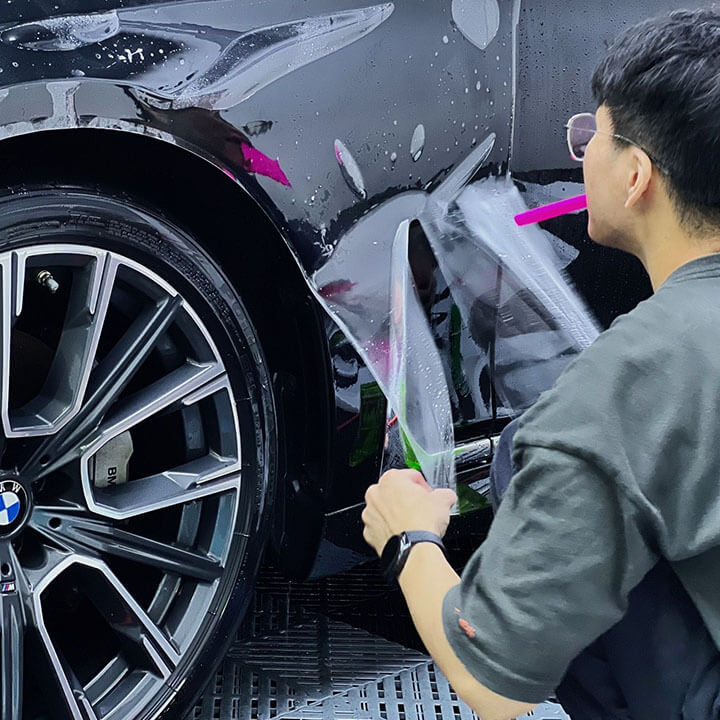
Real-World Scenarios: What Should You Choose?
For Daily Commuters
If your car spends most of its time in urban traffic or parked in lots, PPF on high-impact zones and ceramic on the rest may be ideal.
For Car Enthusiasts
If you go to car meets and want that deep, wet-gloss look, ceramic coating delivers unbeatable shine with less elbow grease.
For Tesla or Luxury Car Owners
“Ceramic coating vs PPF for Tesla” is a common query. Teslas have soft paint, and owners often report issues with chipping. In this case, full PPF is often recommended, possibly with a ceramic coating on top for easy maintenance.
For Harsh Environments
Drivers in snowy, sandy, or gravel-heavy environments benefit most from PPF. Its impact resistance saves paint from long-term damage, even though the upfront cost is higher. Not sure how much film you’ll actually need? Here’s a guide on PPF Usage Volume to help you plan your installation and budget.
Common Misconceptions About PPF and Ceramic Coating
Myth: Ceramic Coating Prevents Scratches
False. It helps prevent light swirl marks but won’t protect against rock chips. Only PPF, also known as a clear bra or car protective film, can do that.
Myth: You Don’t Need Maintenance After Coating
Both options require regular maintenance. While they reduce the frequency and intensity of cleaning, they’re not a “set it and forget it” solution.
Myth: You Can Apply Either One Yourself Easily
DIY kits exist, but results vary. For best performance and durability, professional installation is recommended for both PPF and Ceramic Coating.
PPF and Ceramic Coating Together: The Ultimate Combo
Did you know you can apply both? This is becoming more popular as car owners want both protection and beauty. You can first apply PPF to high-impact zones, then coat the entire car in ceramic to enhance gloss and water repellency. Many pros recommend this combo, especially for high-end cars or dark-colored vehicles.
This also addresses the question, “PPF and ceramic coating together—is it worth it?” The answer is yes, if your budget allows and you’re looking for complete car paint protection. Curious about the exact pricing structure? Here’s a quick overview of PPF Coating Cost across different coverage options.
Best Protection for Your Car Paint
So—paint protection film vs ceramic coating: which offers better value? The honest answer: it depends on your goals.
If you’re concerned about chips, scratches, and long-term paint damage, especially on high-impact zones, PPF is the clear winner. If you’re more interested in shine, water beading, and low-maintenance cleaning, ceramic coating is ideal. And if you want both? Combine them.
When making your choice, consider your driving habits, climate, how long you plan to keep the car, and how much you’re willing to invest. No matter what, some protection is always better than none. Choose wisely, and your car’s finish will thank you for years to come.
Looking to Buy High-Quality PPF at Wholesale Price?
Want to protect your car with premium-grade Paint Protection Film without paying dealership markups? PreproPPF is a leading PPF manufacturer based in China, offering factory-direct pricing, global wholesale supply, and free door-to-door shipping worldwide.
Whether you’re a car owner, detailer, or shop owner, we make it easy and affordable to get the protection your vehicle deserves.
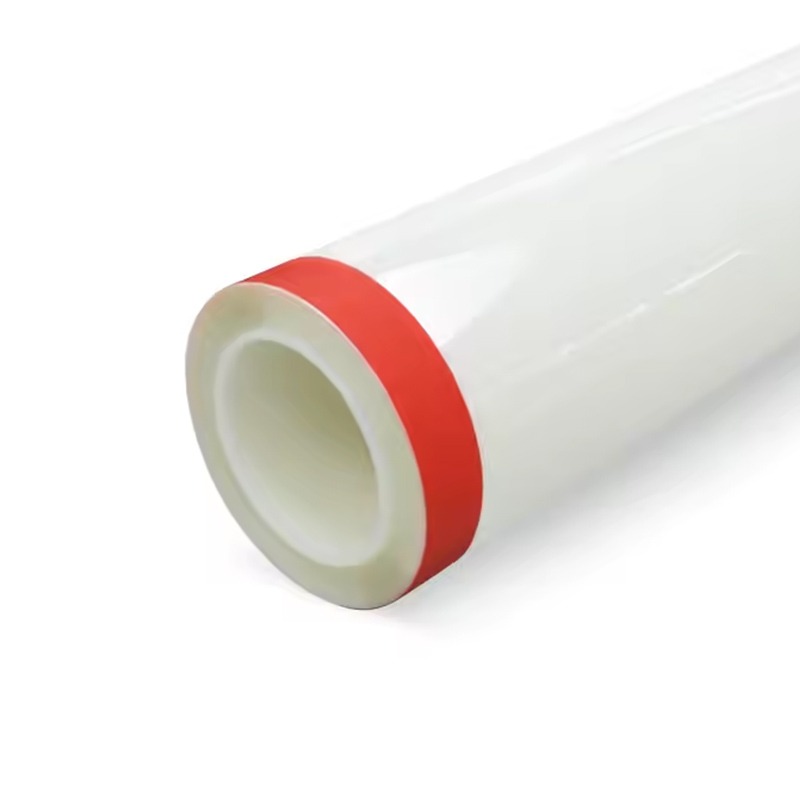
More 3 Frequently Asked Questions
1. What lasts longer, PPF or ceramic coating?
PPF typically lasts 5–10 years, while ceramic coatings last 2–5 years depending on care and product quality.
2. Is ceramic coating worth it for your car?
Yes, especially if you want better shine, UV protection, and easy cleaning. It’s more affordable than PPF and ideal for daily drivers.
3. Which is better: ceramic coating or PPF for black cars?
Black cars show scratches more easily, so PPF offers better physical protection. Ceramic coating, however, makes dark paint pop and stay cleaner.

